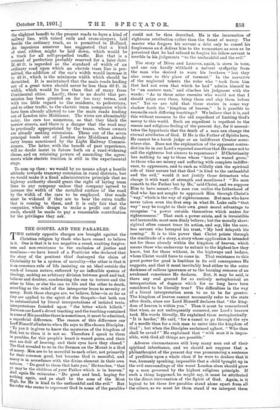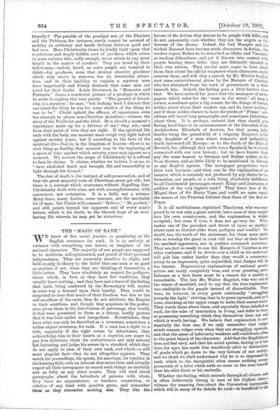THE GOSPEL AND THE PARABLES.
TWOentirely opposite charges are brought against the Christian religion by those who have ceased to believe in it. One is that it is too negative a creed, exalting forgive- ness and non-resistance to the exclusion of justice- and manliness—we have heard of a Positivist who declared that the story of the penitent thief destroyed . the claim of Christianity to be a system of morality—the other is that it is an overstern rule of life insisting on an ideal outside the reach of human nature, enforced • by an - inflexible system of theology, making an arbitrary division between good and bad, believer and doubter, condemning the one to torture and the other to bliss, or else the one to life and the other to death, according as the mind of the interpreter leans to severity or mercy. Both these charges are, we believe, false—in so far as they are applied to the spirit of the Gospels—but both can be substantiated by literal interpretations of isolated texts, interpretations founded upon " the letter which killeth." Between our Lord's direct teaching and the teaching contained in some of His parables there is sometimes, it must-be admitted, a superficial difference. The reason of this difference our Lord Himself alludes to when He says to His chosen Disciples • To you it is given to know the mysteries of the kingdoin of God, but to them it is not so. Therefore I speak to them in parables, for this people's heart is waxed gross; and their ears are-dull of hearing, and their eyes have they closed." The God revealed to us in the Sermon on the Mount is a God of mercy, Men are to be merciful to each other, not primarily for their-common good, but because God is merciful,- and mercy is in accordance with the divine element in their own natures. "Do good to them that hate you," He teaches, "that Ye may be the children of .pour Father which- . is in heaven." Ana again He reiterates : ".Do good and lend, hoping for nothing-
again, and ye shall be the sons of the Most High, for He is kind to the unthankful and the evil." But the ruler who seems to represent God in some of the parables
could not be thus described. He is the incarnation of righteous retribution rather than the fount of mercy. The master who forgave his servant a debt only to cancel his forgiveness an d. deliver him to the tormentors as soon as he perceived that he had refused to forgive his fellow-servant is terrible in his judgments "to the unthankful and the evil."
The story of Dives and Lazarus, again, is stern in tone, and one can hardly withhold a natural syrdpathy from the man who desired to warn his brethren "lest they also come . to this place of torment." In the narrative of the neglected talents the ruler who "took from him that had not even that which he had" admits himself to be "an austere man," and clinches his judgment with the words : "As to these mine enemies who would not that I should reign over them, bring them and slay them before me." Yet we are told that these stories in some way shadow forth the "kingdom of heaven." • Is it possible to reconcile such differing teachings ? We believe that it is, and this without recourse to the old expedient of limiting God's mercy to this world. Such an expedient is repellent to the reason and religious feeling of the present day, for it necessi- tates the hypothesis that the death of a man can change the eternal attributes of God. If He is the Father of Spirits here, He cannot be a harsh judge or an indifferent Creator some- where else. Does not the explanation of the apparent contra- diction lie in our Lord's repeated assertion that He came not to call the righteous but sinners to repentance? If Christianity has nothing to say to those whose "heart is waxed gross," to those who see misery and suffering with complete indiffer- ence, to oppressors, and to such as wilfully sink the spiritual side of their nature but that God "is kind to the unthankful and the evil," would it not justify those detractors who charge it with want of strength and manliness ? "No man cometh to the Father but by Me," said Christ, and we suppose Him to have meant,—No man can realise the fatherhood of God who has not sought to approach Him through Christ's
way," which is the way of righteousness. But men who have never taken even the first step in what St. Luke calls "that way" may be taught to their own great moral advantage to recognise "a power outside themselves which makes for righteousness." That such a power, exists, and is irresistible and inexorable, most men dimly believe ; but the morally short- sighted often cannot trace its action, and say, like the care- less servant who betrayed his trust, " My lord delayeth his coming." . It is to this power that Christ points .through the similitude of a story, a story whose application is intended not for those already within the kingdom of heaven, which means these who endeavour to submit to the highest law they know, but for those without, in the highways and hedges, whom Christ would force to come in. That resistance to this great power for good is limitless in its evil consequence He suggests, and that it must inevitably lead either to the outer darkness of callous ignorance or to the burning remorse of an awakened conscience He declares. But, it may be said, is there any real ground for so entirely metaphorical an interpretation of dogmas which for so long have been considered to be literally true? The difficulties in the way of a literal interpretation seem to us to be far greater. The kingdom of heaven cannot necessarily refer to the state after death, since our Lord Himself declares that "the king- dom of heaven is within you." Then it must be remembered that when, as not unfrequently occurred, our Lord's hearers took His words literally, He explained them metaphorically. "It is harder," He said, "for a camel to go through the eye of a needle than for a rich man to enter into the kingdom of God" ; but when the Disciples exclaimed aghast,." Who then shall be saved?" He explained that "with man it is impos- sible, with God_all things are possible."
Adverse circumstances still keep many men out of their spiritual inheritance, and we should not suppose that a philanthropist of the present day was pronouncing a sentence of perdition upon a whole class if he were to declare that it was, humanly speaking, impossible that a child brought up in the evil surroundings of the worst London slum should grow up a man governed by the highest religious principle. • If such a thing happened, he might say, it must be attributed to the direct intervention of the Spirit of 000. Again, is it logical to let these few parables stand alone apart from all the others, as we must let them stand if we interpret them literally? The parable of the prodigal son, of thS Pharisee and the Publican, for instance, surely cannot be accused of making an arbitrary and harsh division between good and bad men. Here Christianity turns its kindly light upon that mysterious and deeply hidden root of goodness which exists in some natures who, sadly enough, never attain to any great height in the matter of conduct. They are loved by their fellow-men—unduly loved, as some people are tempted to think—for goodness, even that strange abortive goodness which only shows in remorse, has an irresistible attrac- tion, and in their inability to explain a mystery men have impatiently and falsely declared that some men are loved for their faults. Louis Stevenson in "Memories and Portraits" draws a wonderful picture of a prodigal in which he seeks to explain this very puzzle. "The ground of friend- ship is a mystery," he says, "but looking back I discern that one loved the thing he was for some shadow of the thing he was to be." Christ upheld the efficacy of repentance, even too strongly to please non-Christian moralists,—witness the story of the Positivist and the thief. Hew should a moment's repentance make up for a lifetime of sin ? they ask,—and from their point of view they are right. If the spiritual life ends with the body, one moment must weigh very light indeed against seventy years; but if according to the laws of the spiritual life—that is, in the kingdom of heaven—there is no such thing as finality, that moment may be the beginning of a space of time against which seventy years may appear as a moment. We narrow the scope of Christianity by a refusal to face its claims. It claims, whether we believe it or no, to "have abolished death and brought life and immortality to light through the Gospel."
The fear of death is the instinct of self-preservation, and of that the great majority even of Christians never get rid; but there is a courage which overcomes without dispelling fear. Christianity deals with aims, not with accomplishments; with assurances, not certainties. It is a faith, not a science. Many fears, many doubts, some remorse, are the inevitable lot of man; but Christ still counsels "Believe," "Be perfect," and still points beyond the apparent seal of every man's failure, which is his death, to the blessed hope of an ever- lasting life wherein he may yet be victorious.















































 Previous page
Previous page